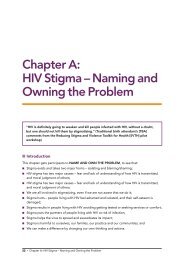Implementing Multiple Gender Strategies to Improve HIV and ... - ICRW
Implementing Multiple Gender Strategies to Improve HIV and ... - ICRW
Implementing Multiple Gender Strategies to Improve HIV and ... - ICRW
Create successful ePaper yourself
Turn your PDF publications into a flip-book with our unique Google optimized e-Paper software.
MAMA’S CLUB<br />
LEAD ORGANIZATIONS:<br />
COUNTRY:<br />
<strong>HIV</strong> PROGRAM AREA:<br />
Mama’s Club<br />
Ug<strong>and</strong>a<br />
Prevention, Care <strong>and</strong> Support<br />
OVERVIEW:<br />
Mama’s Club trains <strong>HIV</strong>-positive mothers as peer educa<strong>to</strong>rs <strong>to</strong> sensitize <strong>and</strong> train community<br />
members in life skills, prevention of mother-<strong>to</strong>-child <strong>HIV</strong> transmission (PMTCT), infant care, <strong>and</strong><br />
human rights. The program also seeks <strong>to</strong> improve the economic status of <strong>HIV</strong>-positive mothers by<br />
training them in life skills <strong>and</strong> income-generating activities. The peer educa<strong>to</strong>rs’ community outreach<br />
activities include giving <strong>HIV</strong> prevention talks at schools, conducting outreach <strong>to</strong> encourage men <strong>to</strong> be<br />
supportive of their partners, <strong>and</strong> using song, dance <strong>and</strong> drama <strong>to</strong> engage community members. A<br />
violence-reduction component involves counselors <strong>and</strong> human rights lawyers in working with the<br />
women, <strong>and</strong> enlists supportive men <strong>to</strong> sensitize other men. The program has found that first-h<strong>and</strong><br />
testimonials from <strong>HIV</strong>-positive women can catalyze social change, <strong>and</strong> that men need <strong>to</strong> be involved<br />
in gender-based programs.<br />
BACKGROUND<br />
<strong>HIV</strong> & AIDS<br />
Program Goals<br />
The primary aim of Mama’s Club is <strong>to</strong> empower <strong>HIV</strong>-positive mothers <strong>to</strong><br />
become community peer educa<strong>to</strong>rs who encourage women <strong>to</strong> attend<br />
antenatal clinics, where they can access antiretroviral medication <strong>to</strong> prevent<br />
PMTCT. The program also seeks <strong>to</strong> improve the quality of life of <strong>HIV</strong>positive<br />
mothers through psychosocial support <strong>and</strong> teaching of life skills<br />
<strong>and</strong> income-generating skills <strong>to</strong> improve their economic status.<br />
<strong>Gender</strong> <strong>Strategies</strong><br />
Addressed<br />
<br />
<br />
<br />
<br />
Reducing violence <strong>and</strong> coercion<br />
Addressing male norms <strong>and</strong> behaviors<br />
Increasing women’s legal protection<br />
Increasing women’s access <strong>to</strong> income <strong>and</strong> productive resources<br />
Other:<br />
Description of<br />
Intervention<br />
Mama’s Club trains <strong>HIV</strong>-positive mothers as peer educa<strong>to</strong>rs <strong>to</strong> sensitize<br />
<strong>and</strong> train communities in life skills, PMTCT, infant care <strong>and</strong> human rights.<br />
Peer educa<strong>to</strong>rs use song, dance <strong>and</strong> drama <strong>to</strong> reach out <strong>to</strong> women. They<br />
also encourage men not <strong>to</strong> reject their <strong>HIV</strong>-positive partners <strong>and</strong> <strong>to</strong> get<br />
involved in family-based PMTCT programs. Peer educa<strong>to</strong>rs talk about their<br />
experiences on radio <strong>and</strong> TV shows, calling for a reduction in stigma <strong>and</strong><br />
discrimination in health facilities <strong>and</strong> in communities, <strong>and</strong> give prevention<br />
talks in schools.<br />
Mama’s Club addresses gender-based violence <strong>and</strong> coercion, which<br />
characterize the lives of most of the peer educa<strong>to</strong>rs, through testimonials<br />
<strong>and</strong> counseling sessions. Female lawyers <strong>and</strong> human rights activists train<br />
peer educa<strong>to</strong>rs in dealing with violence. Peer educa<strong>to</strong>rs also make homebased<br />
visits <strong>and</strong> organize group interactions, which provide opportunities <strong>to</strong><br />
discuss violence <strong>and</strong> related issues with men.<br />
175
















